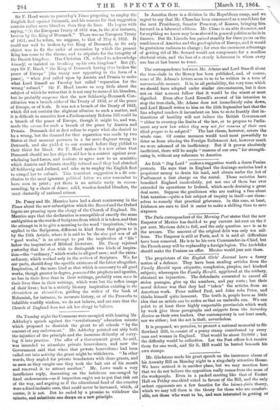Sir F. Head wrote to yesterday's Times proposing to employ
the English fleet against Denmark, and his reasons for that suggestion contain rather more blunders than they do lines. He begins with saying, "(1) the European Treaty of 1851 was, in the first instance, broken by the King of Denmark." There was no European Treaty of 1851, and he refers, we suppose, to that of May 8, 1852. It could not well be broken by the King of Denmark, as its only object was to fix the order of succession by which the present King has come to the throne, and to stipulate for the integrity of the Danish kingdom. Has Christian IX. refused to acknowledge himself, or insisted on breaking up his own kingdom? But (2), says Sir F. Head, " the King of Denmark having thus broken the peace of Europe " [the treaty now appearing in the form of a peace], " when first called upon by Austria and Prussia to make what Lord Russell on Tuesday last called reparation for the wrong' refused." Sir F. Head knows so very little about the subject of which he writes that it is not easy to unravel his blunders, but he probably supposes that the new Schleswig-Denmark Con- stitution was a breach either of the Treaty of 1852, or of the peace of Europe, or of bath. It was not a breach of the Treaty of 1852, which did not contain the slightest allusion to such a matter, and it is difficult to conceive how a Parliamentary Reform Bill could be a breach of the peace of Europe, though it might be, and was, made the excuse for such a breach of the peace by Austria and Prussia. Denmark did at first refuse to repair what she denied to be a wrong, but the demand for that reparation was made by two States at that moment partners in a far more flagrant wrong to Denmark, and she yielded to our counsel before they yielded to their thirst for blood. Sir F. Head makes it a new crime that Denmark should use her ships to aid her in a contest against over- whelming land forces, and hesitate to agree now to an armistice which Austria and Prussia ste.'►dily refused until they had clutched all Schleswig and Jutland, and asks us to employ the English fleet to compel her to submit. This truculent suggestion is a fit con- clusion to the most ignorant political letter we ever remember to have seen in print ; yet there is an artistic unity in recom- mending, by a chain of dense, solid, wooden-headed blunders, the most dastardly of national crimes.


































 Previous page
Previous page